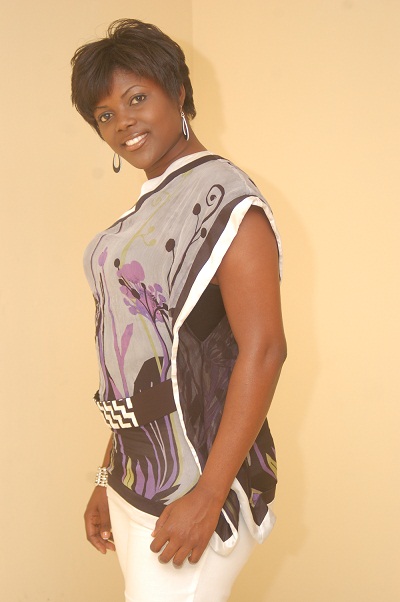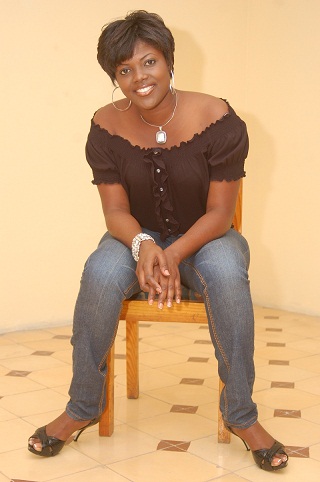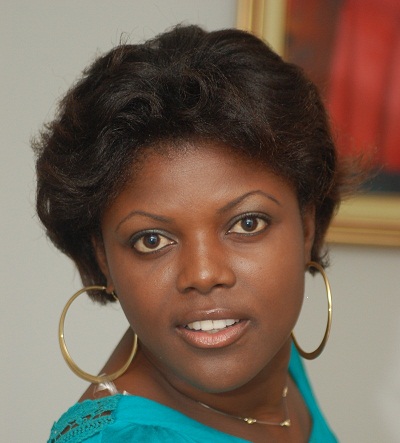CSMS Magazine
If there is a personality in the Haitian Movie Industry who could truly shake the souls of moviegoers, it would be Michelle Judith Jeudy. I always have said that acting is a distinct kind of art which requires impeccable talent. It feels like renting your body to the intelligence of a character. It is the embodiment of a writer’s creed. Success or failure depends on the skills of the executioner, as Michelle Judith Jeudy herself acknowledges in this interview. Until few years ago when she took a pause from her acting career to pursue a license in the medical field, Michelle had been riding ahead of the curve, bypassing in full speed her competitors to finally clinch the title of the most gut wrenching Haitian actress on the Big Screen; especially when it came to deliver the knockout punch to moviegoers and producers alike. Besides the unquestionable talent, Michelle tops it all up with her natural beauty—a gift from God, she would say when being teased by her peers.
An exuberant young woman framed in the hue of a milky coffee, Michelle never hides her self-assuring posture, her sharp piercing amaranthine eyes, her profound gaze, her feline gestures that all romancero would crave. I’ve known Michelle for a number of years. She had been an outstanding student of mine when I was a young professor at Broward Community College, near Fort Lauderdale, Florida.
Michelle is also the resilient young woman with a dazzling moral heroism who understands thriving in this country can never depend on an industry (HMI ) that can ill afford to spend millions behind our best and brightest in the world of cinema. Consequently, she has used her puckish wit to create what she calls, Plan B—going back to school to earn a degree in nursing. Now, she strolls with her head high, leaping towards the zenith of her life. There is a scoop here! Readers must read on to find out!
Michelle Jeudy commends a lot of respect among her peers, as it was demonstrated during her fulgurous and fulgent wedding back in 2010. Three weeks ago, I had the pleasure to sit down with Michelle for a chat during which she talked about her career, her family, her future project, and most important of all, her hope for her motherland of Haiti.
AI: Good morning Michelle, it is quite a pleasure to have you here at CSMS Magazine. You have always been called, “The Princess,” and most fans seem to have a genuine connection with you. Can you tell our readership the main reason behind this?
MJJ: Good morning Dr Ardain, the pleasure is mine. I have been called “chwal alman”, “fanm anraje” “moun violan”, princess may be one of the nicest name I’ve been called. I’m very close to my public. I want them to make me part of their home while watching my movies. If calling me a particular name can create that intimacy, so be it.
AI: It’s been some time since you made your last appearance on the BIG SCREEN. Many of your fans I have spoken to, with indescribable passion, expressed a feeling of nostalgia. One gentleman from Long Island, New York, has confessed that he feels he has been put on a hook and left abandoned there. So what have you been doing over the last few years?
MJJ: The nostalgia is equally shared, in case my fans were in doubt. I truly miss the BIG SCREEN. My first appearance on the big screen was a pure accident, a happy one, I confess. The Haitian cinephiles fell in love with me from that very first appearance, and I’m very grateful for that. All this is to say that I owe them a special gratitude. I may take a break for a while, but it will take a lot to disappear completely from the scene. To finally answer your question Dr Ardain, for the past few years, I have been very busy with school, work and family. I started a career in Nursing, I got married, and I gave birth to the most loving son someone could ever have.
AI: I understand you were married in 2010. Can you tell the readers who was the lucky, charming prince?
MJJ: The prince charmant is from Kenya. He is from the same tribe as President Obama’s deceased father. Often, my patients tell me that I have some resemblance with the first lady Michelle Obama (laughing). If that is true, I guess we have some real ties.
AI: According to Belfim.com, the groom’s parents had to be flown out of Kenya, can you tell the readers about the circumstances that led to your first encounter with the young man who was going to be your husband?
MJJ: Shout out to Belfim! Great website for the Haitian Movie Industry. Belfim was the only medium invited to the wedding. Yes, my husband’s parents, his sisters, and uncle witnessed our union. I met my husband at work. We are both nurses.
AI: When I learned about the wedding, I felt bruised, I must say (grin), for I was not invited. However, I was told that lots of VIPs were at hands. Among them were Fabiola Douyard and Naomi Calixte of Haiti’s Radio Metropole etc… Any other celebrities at attendance?
MJJ: Although I had a big wedding, over 200 guests, the attendance was made mostly of my family and close friends. Fabiola Douyard and I met on the set of Xtreme Blue in 2007, and since then we’ve been sharing a friendship. I’m taking this opportunity to congratulate her on her achievement. She recently graduated as Registered Nurse. Naomie Calixte is a former colleague. We met in Haiti as journalists. She was at that time reporter for Radio Metropole and I was a writer/reporter for Haiti Press Network, one of the pioneers of web news in Haiti. Besides Nahomie, movie director Herold Israel, TV personality Eric Junior Prevost, Haitian Rap artist Peter Berlus, model/actress Kacendre Belizaire, and Ticket photographer John Jean-Pierre were counted among my guests.
AI: Since being married, have you been starred in any motion picture? If yes, which one? If no, is there any plan to return to cinema?
MJJ: My last movie was Xtreme Blue, and since then I haven’t stood in front of a camera. I think CSMS is about to get a scoop! I’m now working on one if not two projects with Herold Israel. I’m very excited to come back. I’m also thrilled to see the Haitian Movie Industry is reviving. I salute the courage of certain optimistic directors and marketing agencies such as Communication Plus that never gave up. These people inspire me and give me more motivation to come back to the job I do without being stressed out.
AI: Sub-Saharan Africa has a flourishing movie industry, particularly Ghana and Nigeria. Have you ever thought of querying this part of the globe?
 MJJ: Their movie industries are very prolific. I was watching a documentary about Nollywood, the Nigerian’s version of Hollywood, just a couple of days ago. It was stated that the Nigerian market receives at least 30 Nigerian movies every week. This is a very significant number if you keep in mind the amount of work it takes to put together one movie. I’m not sure of the quality of the finished products; however, this is still pretty impressive. I wish the HMI’s production was that productive. I must admit that we have a smaller market, and the language plays a big role in the success of those two countries, commercially speaking. As for my interest at that level, I’m very open-minded. I’m an artist. Therefore, there should be no geographical limit for my talent. I was approached one time by an African director. Unfortunately, it didn’t work out because of my unavailability at that time.
MJJ: Their movie industries are very prolific. I was watching a documentary about Nollywood, the Nigerian’s version of Hollywood, just a couple of days ago. It was stated that the Nigerian market receives at least 30 Nigerian movies every week. This is a very significant number if you keep in mind the amount of work it takes to put together one movie. I’m not sure of the quality of the finished products; however, this is still pretty impressive. I wish the HMI’s production was that productive. I must admit that we have a smaller market, and the language plays a big role in the success of those two countries, commercially speaking. As for my interest at that level, I’m very open-minded. I’m an artist. Therefore, there should be no geographical limit for my talent. I was approached one time by an African director. Unfortunately, it didn’t work out because of my unavailability at that time.
AI: Many moviegoers have compared you with Fabienne Colas. Both of you have been known for explicitly raw scenes. Do you agree to that?
MJJ: I’m flattered. I was fortunate enough to share the big screen with her. I admire her work, especially now that she is promoting the Haitian culture overseas.
AI: You know Michelle, I have known you since 2005 when you were one of my students at Broward Community College (BCC) in Broward County, Florida. You have always been a young woman with sharp, piercing eyes with a gaze ready to give the knockout punch. Do you think these characteristics might have been the drive behind the reason why movie producers have assigned you these revealing roles?
MJJ: I can’t deny it. I can be strong at times, despite that; there is a very sweet and sensitive woman behind the characters that I play in my movies.
AI: Haiti has always been very close to your heart. You have demonstrated it time and time again-in your movies as well as in your writings. Don’t you think living outside of Haiti could be an impairment to what you would have liked to do for your motherland?
MJJ: Haiti is all I know. I have fully lived 24 years of my lifetime there, between Cayes-Jacmel and Port-au-Prince. As much as I’m thankful to America for its limitless opportunities, nothing can take away my love and dreams for the alma mater. Like every good son or daughter, I know I have to go back and pay my dues. My country needs me.
AI: Is acting your preferred artistic genre? If yes, why?
MJJ: Definitely. This the one place where I can be myself and I can still be someone else. Love it!
AI: You have magnificent skills in creative writing, if I could remember. You’ve never thought of exploring this avenue?
MJJ: I stopped writing when I decided to embrace Nursing as a career. The medical field is a language on its own. It was very challenging for me to learn English, the language of medicine and keeping up with writing. I had to temporarily make a choice. Now, I think the time is appropriate for me to recidivate. I will definitely need those skills if I want to pursue my dream and be helpful to my country.
AI: I admire your pragmatism when it comes to strategic thinking. Parallel to your public life, you also have a well-grounded private/professional life. You are also nurse. Few of your peers can claim to have both. Is it because the movie industry does not guarantee financial security, as they always say?
MJJ: I’m very ambitious and practical. It is not a secret that the Haitian Movie Industry cannot feed its own. I’m a big believer in plans B. Someone always needs something to fall back on. In addition to nursing, I’m a florist designer, a balloon decorator, and on my free times I braid hair for friends and family.
A.I. Really? This is stunning!
MJJ: Well, we’re Haitians; we’re resilient survivors.
AI: Here is a question I always ask my Haitian actors. Haiti has produced impeccable actresses the whole humanity has claimed for its own. Toto Bissainthe, Martha Jean-Claude, Garcelle Bauvais to name a few. Most of them have long passed on, and they have left a legacy, a heritage, if you will, that makes all of us feel so proud and empowered to speak about. Do you see yourself being part of this fulfilling legacy? If yes, how?
 MJJ: First, I have to say that it is an honor for me to claim these ladies as ours. As role models, they set the bar high for Haitian female artists. Although they all, for the most part, work abroad they have always kept strong ties to Haiti. This brings me closer to them and shows me it can happen anywhere. If the legacy chooses me just like the Haitian cinema chose me, I will not refuse. For now, I remain modest and continue to improve my acting skills. I believe in destiny.
MJJ: First, I have to say that it is an honor for me to claim these ladies as ours. As role models, they set the bar high for Haitian female artists. Although they all, for the most part, work abroad they have always kept strong ties to Haiti. This brings me closer to them and shows me it can happen anywhere. If the legacy chooses me just like the Haitian cinema chose me, I will not refuse. For now, I remain modest and continue to improve my acting skills. I believe in destiny.
AI: What is your favorite Haitian actor/actress?
MJJ: I really like the charisma of Gessica Geneus on the Big Screen.
AI: Some Haitians have become quite successful in show business here in the United States-whether it is in literature, cinema or music. Do you ever dream of crossing over to join them some day? If yes, has there been any effort on this avenue?
MJJ: Like I said before, my talent has no geographical boundaries. If I’m an artist, I have to be genuinely cosmopolitan as much as I can. I have dreams that I only keep for myself, maybe one day when I get closer to their realization, I will be able to share them with my fans. I’m lucky that my art has no age. I can still be an actress at any age.
AI: Who discovered you as an actress?
MJJ: This is a long story, but I’ll make it short. I was called by Caleb Desrameaux to join him on the set of Protège-moi. I spontaneously refused due to the fact that I’m a terrible stutterer. We were on the phone arguing when Jean-Gardy Bien-Aime grabbed the phone from him and said to me “They’re picking you up tomorrow at 3, someone will call you in a few”. This is how everything started.
AI: What were your parents’ reactions once it became clear that you have made a solid choice on acting?
MJJ: My parents always support me in everything I do. Cinema was no exception. They are indeed very proud of my work.
AI: I interviewed Dolores Telson last week, who spoke passionately about her big dream for Haiti. Dolores and you co-starred in the movies Dolores. Any project for Haiti?
MJJ: I’m working on it. “The walls have ears”.
AI: A.I.: Where do you currently live?
MJJ: I live in Fort-Lauderdale, Florida. I want to be as closed as possible to home and my Haitian groceries, at least to be as close as I can get to them. I have to be able to make my ‘soup joumou” whenever I feel like it.
A.I.: There are a lot of young talented Haitian artists who inspire to secure a career in acting. What advice can you give them?
MJJ: Follow their heart. There’s still hope for the Hatian Movie Industry. We need talent first, and logistics will follow.
AI: Michelle, we could chat forever. But as everything in life, our conversation has reached its end. Is there anything you want to tell your fans and-by extension-our readership?
MJJ: Don’t stop supporting the Haitian Movie Industry. There’s no HMI without you. As long as you live, there’s hope.
AI: It’s been a pleasure, Michelle.
MJJ: The pleasure has also been mine.


